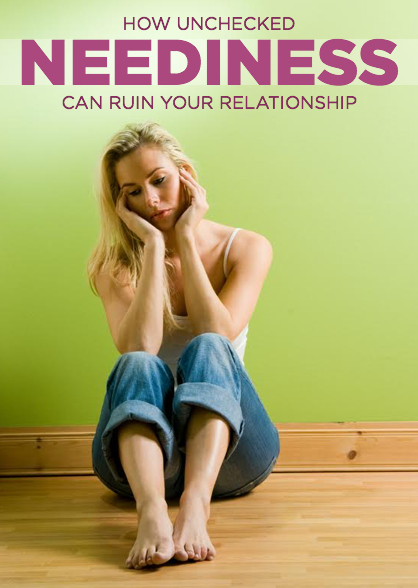How Unchecked Neediness Can Ruin a Good Relationship
Don’t let your insecurities get the best of you
Sometimes, the best relationships can take a negative turn due to anxiety issues. If you feel that you need constant reassurance that your partner loves you, perhaps it’s time to take a step back and look at your behavior and figure out why you are suffering from insecurity.
It’s important to have the love you need, but if you have it, but lose that loving feeling as soon as the slightest thing happens, then you need to stop your behavior before you ruin a good thing. Trust us, it can happen.


The root cause of neediness
The truth is that neediness is actually the result of anxiety. Most anxiety and neediness is a result of problems within your relationship with yourself, said Tina B. Tessina, PhD, (aka “Dr. Romance”) psychotherapist and author of It Ends With You: Grow Up and Out of Dysfunction.
“Not knowing how to love yourself not only creates neediness and anxiety, it also means you don’t know how to love others. Trying to get the love you need from yourself from a partner makes you insatiable, and therefore needy,” she said.
To resolve the anxiety, follow these steps recommended by Tessina:
1. Learn to recognize the signs of your own anxiety. If you can't sleep, you worry a lot, you ruminate or obsess about negative possibilities, or you're unusually irritable or needy, you are probably anxious.
2. Give yourself a chance to complain and express your fear. When you're facing the involuntary changes that are the result of a disaster, you will have some resistance and objections to dealing with it. Allow yourself some time to complain and be unhappy about the situation. Express as many of the negative feelings and thoughts as possible, either verbally or on paper. If your fear is really overwhelming, a therapist can help you with this part.
3. Evaluate your fears and complaints. Allow yourself some time to consider the points you made in your list. Is there anything that you can do differently? Do you want to? Have you made all the choices you can? Are you thinking clearly about the problem? Are you angry at anyone specifically? Are you resisting unnecessarily? If you have a choice, do you still want to change things? If you don't have a choice, can you see some alternatives? Do your options look different to you now?
4. Befriend yourself to build trust. Discuss the problem with yourself as helpfully as you would with another friend. Brainstorm for ideas, realistic or even silly, about what you could do to make things better. For example:
• I could move to Timbuktu and avoid the whole thing.
• I could talk to Harry and see if he can help me think this through.
• I could ask Martha to help.
• I could find a Genie and have him make this all better.
• I could win millions in the lottery and be able to buy my safety.
• I could go on with my life, doing the best I can, and trust that God will take care of me.
5. Do whatever you can to check the facts about safety, and consider all the possibilities for taking care of yourself and those you love.
6. Review and decide. Once you've expressed your anger and disappointment, evaluated your feelings, brainstormed ideas and checked the facts, you will be feeling much more in charge of yourself and this situation. Review what you've discovered and make some decisions.
7. Sell yourself on a positive outcome. Think of all the possible great outcomes of the changes you're making. Consider what you will learn from it. Figure out how you can maximize the benefits of making the change. When you've convinced yourself, make a commitment to your plan.
8. Post and follow your plan. Draw up a plan for making the best possible results come out of this change. Put the plan where you can see it and read it every day. Do your best to follow the plan, so you'll feel safe.
Jealousy is a potential outcome
Unchecked neediness needs to be addressed, said Toni Coleman, LCSW, CMC, psychotherapist and relationship coach.
“It can lead to jealousy, relationship stress, and conflict over a partner’s desire for more autonomy and independence. Therefore they will need to set goals to address the underlying problem of insecurity and an inability to meet their own needs, instead of looking to their partner to do it for them,” Coleman said.
You definitely want to avoid the whole crazy jealous girlfriend routine, so take care of yourself, and your anxiety, before it manifests your own worst fears - the end of your relationship.


